Good news for the Portland Bureau of Transportation: One of their newest tools to improve crossing safety at intersections just got a stamp of approval from new research from the nonprofit Insurance Institute for Highway Safety (IIHS).
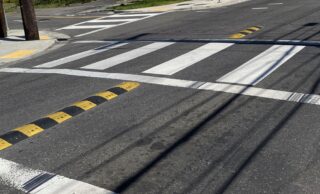
(Photo: J. Maus/BikePortland)
Last summer PBOT rolled out a new type of speed bump they call ‘left turn calming’. These rubberized bumps are placed in intersections where car users tend to turn left too quickly and/or cut the corner. The idea is that the bumps force people to make sharper turns, drive at slower speeds, and have better visibility of people in the crosswalk.
According to new research from Washington D.C., this “centerline hardening” treatment is associated with a 70.5% decrease in conflicts between drivers and crosswalk users. A paper published this month by IIHS-funded researchers Wen Hu and Jessica Cicchino, also found that the bumps lowered mean left-turn speeds by nearly 10% and reduced the odds of people going over 15 mph while turning left by 67%. Hu and Cicchino studied 10 intersections in D.C.
Advertisement
Left turn collisions are the bane of traffic safety advocates. In 2018 they accounted for almost one third of all intersection collisions nationwide that involved a person on foot. According to State of Oregon data, 20% of crashes involving walkers (between 2006 and 2015) were the result of left-turning drivers failing to yield to people in crosswalks at signalized intersections.
Last year PBOT installed left turn calming bumps at over two dozen intersections citywide. Learn more on their website.
— Jonathan Maus: (503) 706-8804, @jonathan_maus on Twitter and jonathan@bikeportland.org
— Get our headlines delivered to your inbox.
— Support this independent community media outlet with a one-time contribution or monthly subscription.




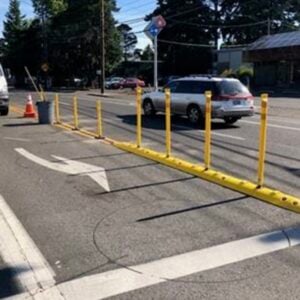
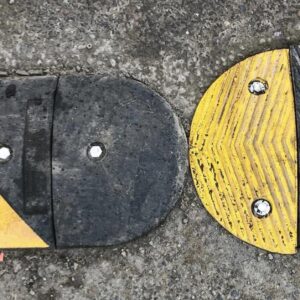
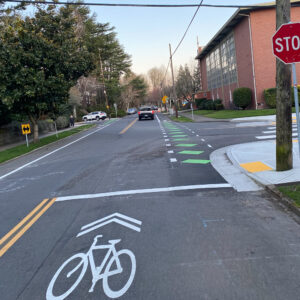
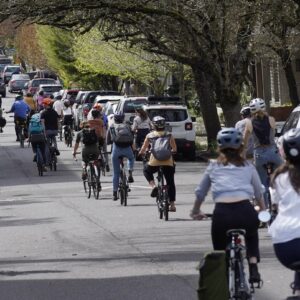
Thanks for reading.
BikePortland has served this community with independent community journalism since 2005. We rely on subscriptions from readers like you to survive. Your financial support is vital in keeping this valuable resource alive and well.
Please subscribe today to strengthen and expand our work.
Love these. The similar right-turn calming from SW 4th onto eastbound Market has made a big difference to me as a pedestrian.
I love them too, but they seem to be encouraging drivers into the bike lane at Willamette and Portsmouth (though I guess, in theory, the bike lane should be empty if the car turning has a green light).
But if you’re the oncoming traffic and you want to turn right then aren’t you allowed to make a right into the bike lane while the car across from you is making a left into the auto lane?
It’s dangerous to design these in such a way that in order to avoid them it forces drivers into an adjacent lane that could be occupied. It seems that’s what they’re doing with some of these here in town.
This one is also creating a head-on collision for cars. no bueno.
I see plenty of drivers blissfully drive over them, but every bit helps. I think they look pretty sharp as well.
I’ve noticed a few installations when driving where it seems to be impossible to make the turn without running over them. I don’t particularly mind this, but it’s a little bit confusing.
Where I’ve noticed this is where one-way streets intersection with two-way streets (I think I’m thinking of NW 10th and Couch, by Powells). Drivers are turning left from the left lane, and it’s not possible to make make that turn without running over the outermost of the barriers.
I have one of these quite near me, at an intersection where more than one pedestrian had been hit or even killed. (55th and E Burnside) I agree HK that drivers can and will drive over them but I’ve watched behavior here and will say they do it slower, more cautiously and most importantly more observantly than they had before. So yes every bit helps, and this helps a lot. Those still driving bloatmobile SUV’s are clearly more challenged here, but maybe this will get them to rethink owning an absurd vehicle like that in an urban environment. We all see them dangerously dwarfing parking spaces both on and off street, blocking sightlines etc, so next step is to have relatively few “oversize” spaces for legitimate users of larger vehicles (commercial delivery etc) and enforce that. They certainly shouldn’t be allowed to park on narrow residential streets and or neighborhood greenways.
From my observations while biking in DC, these median curbs are temporary fixtures that are gradually being replaced with more permanent (and taller) concrete medians as the streets are repaved or rebuilt. Like a lot of other US cities, DC has a lot of streets that badly need to be repaved.
I think this is one intervention from PBOT which is making a big difference. Of course some people run over it with no concern, most do not. I think a lot of people are just getting used to them and adapting.
Probably one-third of the plastic wands used to create a “protected” bike lane on SE 45th Avenue are missing. At least the bumps will stay a bit longer. I am skeptical that the bumps will have a long-lasting impact on driver behavior.
How quaint that the first image shows an automobile turning left into the near lane. That must be some hold-over technique shown in a drivers manual somewhere.
Interesting note: 31% of traffic tickets written in Portland, Gresham and Beaverton (no data for Tigard or OC) are for failure to turn into the near lane.
They added this northbound on SE 99th turning left onto SE Stark. It makes it impossible to make a left there without going into the other lane. There’s no turn radius, at all. I don’t think they thought this through for 1-way streets. You end up having to do a button-hook turn, which makes me uncomfortable.
This location? https://goo.gl/maps/Gh1dLjGQgfLhV81N7
With the clearly marked lane lines permitting drivers into the second lane?
Yes, that one. Also into the third lane. Maybe. There’s only one dashed line so is it for only the outside lane? Either way, I don’t want those lanes. Try making a left into the left lane from there (so you can go south on I-205). Or from Stark. You can’t do it without swerving into the adjacent lane. It seems that they only want you to go north on I-205 or be in the right lanes after you turn. That’s not where I usually want to go right there. And yes, it’s unlikely that there will be other cars there, but it makes me nervous because it’s not a normal turning maneuver.
But as Steve Hash posted above this treatment is causing drivers to veer into bike lanes that could be occupied.
I don’t want to give drivers any more room than they need, but I think some of the places they’ve put these treatments are dangerous and/or create bad driving habits and they need something else to make them safe.
I think these are good cheap methods. A similar installation slows down the right hand turn from Interstate to Mississippi – a turn people used to take a high speed.
This particular one helps a lot because of the angles. Since this was put in, the previously common issue of cars racing to make turns in front of bikes has basically disappeared.
If you hit one of these on a bicycle, which isn’t hard to do, you’re going to hurt yourself.
Same with hitting a curb, getting a tire caught in a rail track or other mistakes. But paying attention and having riding skills generally solves those problems. Plus, the firm rubber is a bit of a bump (though easily avoided) but hardly likely to get one hurt… if you’re paying attention. If you’re not paying attention when cycling then you’re more like the motorists for whom these were installed to protect us from! Not to dismiss your concern but urban cycling does take a baseline set of skills.
It’s a good idea to pay attention while riding your bike.
Sorry, but not every cyclist has Cat1 bike handling skills or adequate lighting to see these things when it’s dark and wet out, and BPOT should definitely not be putting low-profile low-visibility hazards in the ROW for cyclists to hit, because the consequences of hitting one of these things on a bicycle are infinitely greater than the consequences of hitting one in a motor vehicle.
It is amazing what a bit of intersection geometry tweaking can do when you work with physics AND are motivated to prioritize traffic safety solutions over other mid [last] century objectives like vehicular capacity or “maintenance”.
These type of mini mountable extensions are called “hedgehogs” in the UK.
What shall we call them in the NW? …Marmot? Otter? Beaver?
These rubber bumpers have created problems at intersections that didn’t previously have issues. The ones located at SE 30th and Hawthorne have increased congestion at that intersection and force pedestrian and bike traffic to interact more directly with vehicle traffic. By attempting to direct vehicle traffic into a narrower area that also directly competes with the oncoming traffic these make the streets more dangerous. I’ve seen more close calls and all road users confused by the changes.
The bumpers also force cars attempting to make left turns in opposing directions into the same space where they previously could avoid each other and other road users. Also since these reduce the number of cars that can make it through the intersection each light cycle and creates backup it directs more cars into the smaller residential streets and adjacent bicycle greenways on SE Salmon and SE 29th Ave. A poor design decision that is causing more problems than solutions.
I have noticed these out on the streets. In some locations, it doesn’t seem possible to make a left turn simultaneously with the opposite direction left turning vehicle because you have to drive further into the intersection. It certainly does cause one to slow down more. It’s also a bit of a distraction if you try to avoid running over them, looking for cars turning in the other direction and pedestrians.
More, please! These devices have very little downside.
Saw a nasty T-bone accident the other day on 92nd and Foster, likely this little bump had a part to play. Sedan from 92 turning onto Foster got hit by another driver who swerved around a bike, while forcing the yellow. 92.d Ave driver was too far into the intersection in order to go around this little bump, and took longer to make the tight turn as a result, saw the swerving car in the opposite lane too late, and bam. both cars with popped airbags and police + tow trucks. I get why they placed them here, but it restricts movement and turning circle. And these were a car and a small SUV, not some monster truck towing a trailer… Roundabouts are way safer than restricting lanes, see Bend!